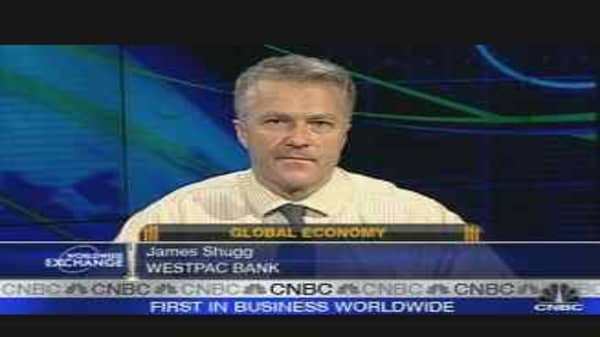It was the fourth straight fall and took the headline index to its lowest level since February 2006. Economists surveyed by Reuters had forecast a reading of 105.0.
"The first signs of brakes on growth are noticeable. Recent events on the financial markets probably also contributed to that," Ifo President Hans-Werner Sinn said in a statement.
The head of Germany's BDI industry federation, Juergen Thumann, said on Tuesday he was worried that the euro would eat into the profits of German exporters. The currency has hit a succession of record highs above $1.41 in the past week.
Although the strong euro helps to moderate the effects of high oil costs, there is also concern that a spike in U.S. crude prices to record levels will saddle firms with higher costs.
"The mixture of high uncertainty about the fallout of the subprime crisis ... and the new record highs in the oil price as well as the euro-dollar exchange rate dampened the solid business outlook," said Unicredit economist Alexander Koch.
Worried Investors
Last month's Ifo survey, the first since fears of a global liquidity crisis hit financial markets, showed companies remained largely upbeat about current economic conditions.
Although business confidence has fallen steadily, the latest Ifo headline index was still well above its long-term average.
Last week, the Mannheim-based ZEW institute's survey of analysts and institutional investors fell sharply on worries about the credit squeeze caused by a crisis in the U.S. subprime mortgage market, plus concerns about the euro and oil prices.
German carmaker BMW last month reported a big drop in second-quarter pre-tax profit as the strong euro eroded margins at its core automotive business.
Barclay's Capital economist Julian Callow said the latest Ifo survey reflected a wider trend in the euro area.
"This is particularly important because the manufacturing sector in the euro zone area is going to get squeezed by some slowing in global demand growth as we go further forward and as well as by the stronger euro," he said.
Yet big orders continue to roll in for German firms. On Monday, Spanish energy group Endesa said it had awarded a 470 million euro ($663 million) contract to German industrial group Siemens to build plants in France.
However, fears of a broader slowdown in activity could make the European Central Bank hold its main lending rate at 4.0%, said Jennifer McKeown at Capital Economics.
The Ifo survey's gauge of current business conditions fell to 109.9 from 111.4 in August, while the index of companies' business expectations dropped to 98.7 from 100.4.
Gerd Hassel, an analyst at BHF bank, said German business sentiment was likely to decline further in the next few months, but added that there was light at the end of the tunnel.
"The U.S. mortgage crisis will not last so long. The fourth quarter of 2007 and the first quarter of 2008 will probably be weaker," he said. "After that it will go up again."



